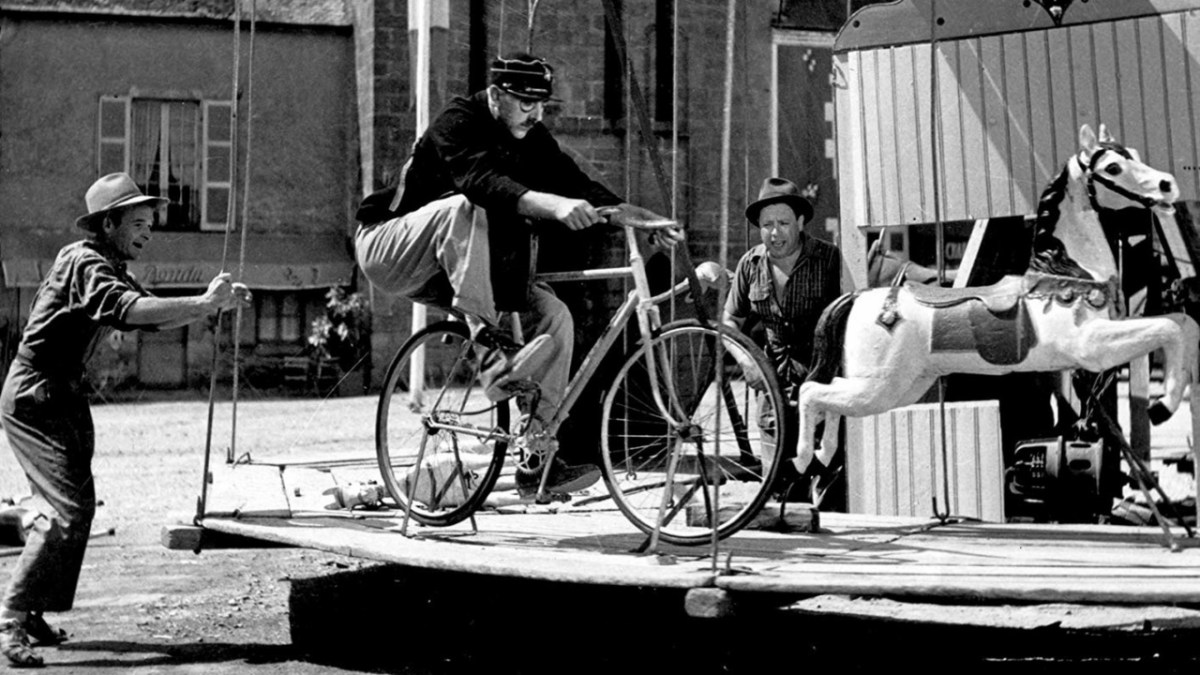Tati’s debut feature is a charming little piece about a postman in a countryside town, filled with the kind of visual gags and physical humour that would define his future works.

REVIEW #1,486
Dir. Jacques Tati
1949 | France | Comedy | 86 mins | 1.37:1 | French
PG (passed clean)
Cast: Jacques Tati, Guy Decomble, Paul Frankeur
Plot: A postman serves a little town on a bicycle, and one day, a travelling fair comes to set up in the town square.
Awards: Won Best Screenplay & Nom. for Golden Lion (Venice)
Source: Studiocanal
Accessibility Index
Subject Matter: Light
Narrative Style: Straightforward
Pace: Normal
Audience Type: Slightly Mainstream
Viewed: Criterion Blu-ray
First Published: 25 Aug 2017
Spoilers: Mild
Jacques Tati, who made shorts early in his career, transited into feature filmmaking in 1949 with Jour de fete (or “Day of Celebration”), a charming little picture about a postman (played by Tati himself) who serves a countryside town on his bicycle.
A buzzing resident bug defiantly greets him whenever he enters the small town, and the townsfolk, some cheery, some jaded, would anticipate his arrival.
This anticipation is brought to a whole new level in the second half of the film when Mr. Postman, after watching an American documentary about flying US postmen with advanced technology during a day fair, begins to appreciate the need for speed and efficiency in his line of work.
The day fair, is of course, the central attraction in the film—though that could be said of Tati himself in literally every single film he has done hence forth.
Tati is a showman, perfectly at ease in milking laughs by ridiculing himself through a series of visual gags and physical humour, elements that would be further developed, and with bigger scale and scope, in such works as Mon oncle (1958) and Playtime (1967).
“It’s not my fault if your goat gobbles up telegrams.”
In Jour de fete, Tati’s approach is one of unadulterated simplicity. A visiting fair is set up by a travelling troupe, and then torn down the next day. The townsfolk get drunk, particularly the men, while the women lament at the ruckus. The kids, however, enjoy their day in the sun.
Tati bookends the film with a scene of a truck ferrying dismantled merry-go-round horses coming to/heading away from town. A boy marches after the truck… would it return next year?
It is through this simplicity and Tati’s unique brand of comedy that a feeling of poignancy creeps into the film. No matter how absurd some of the scenarios are, Tati’s strength has always been his ability to make his characters feel human—that we recognise their fallibility, maybe even gullibility, yet we (like them) try to continue to live.
I think this is something that has shaped Tati’s worldview for much of his career, and his body of work is a testament to his belief in humanity’s spirit in soldiering on, even when personal setbacks or the perils of modernity suggest that we might be headed into oblivion instead.
Grade: B+
Trailer:
Music:












[…] claim to fame was a series of comedies centering on the fictional character of Monsieur Hulot – Jour de fete (1949), Mr. Hulot’s Holiday (1953), Mon oncle (1958). He probably reached his creative apex with […]
LikeLike
[…] are cautionary tales about the perils of modernity, then Jacques Tati’s early works such as Jour de fete (1949) and Monsieur Hulot’s Holiday are blissful engagements on the possibility of an optimistic […]
LikeLike